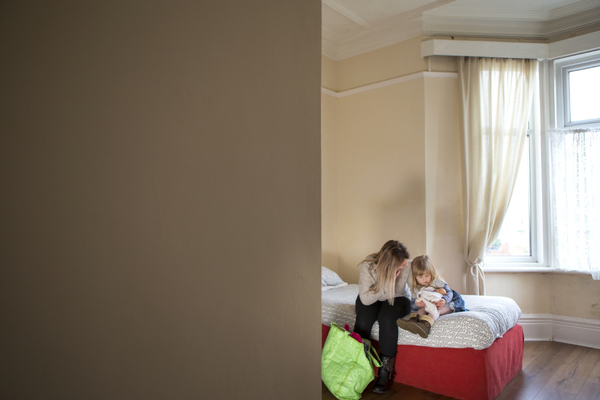You are viewing 1 of your 1 free articles
Progress is being made on Northern Ireland housing policy, despite the uncertainty
The lack of government in Stormont is challenging for organisations such as the Northern Ireland Federation of Housing Associations (NIFHA), writes chief executive Ben Collins
We are a year on from the collapse of the Northern Ireland Assembly and Executive.
Under the direction of recently appointed secretary of state for Northern Ireland Karen Bradley, a new round of political talks aimed at restoring the political institutions has started.
We want to see the early restoration of the Northern Ireland Assembly and Executive, so our democratically elected representatives can make vital decisions on the vast array of issues which need to be addressed, especially as there are budget pressures across all government departments.
At the time of writing, it is unclear whether these talks will lead to a political breakthrough. This is undoubtedly a challenging time for organisations such as the NIFHA, which seek to influence policy, when we do not have a government.
It is also difficult for civil servants who are criticised for making decisions, as well as for not taking them. Despite this uncertainty, some progress has been made.
“This is undoubtedly a challenging time for organisations such as the NIFHA, which seek to influence policy, when we do not have a government.”
At the end of March 2017, the Northern Ireland Housing Executive announced a 5% (£3m) cut to funding for accommodation-based services within the Supporting People Programme, which helps vulnerable people live as independently as possible.
In response, the NIFHA and partners ran an extensive campaign for the funding to be reinstated and safeguarded for future years.
In October, it was confirmed that one-off funding of £2.6m would be allocated to Supporting People.
The NIFHA and partners continue to campaign on this vital issue, pointing out that for every £1 spent on Supporting People, the state saves the public purse £1.90 that would otherwise have to be spent on health, care and other services.
There has been a real sense of partnership over the past year between government departments, the Northern Ireland Housing Executive (NIHE), and other organisations in the housing sector.
The work we have been doing to help to facilitate a smooth roll-out of Universal Credit across Northern Ireland is a leading example of this. We continue to work with the other housing federations across the UK on this and other issues.
“We want to see the continuation of a soft border across the island of Ireland.”
Brexit poses many challenges, particularly for Northern Ireland. Like so many, we want to see the continuation of a soft border across the island of Ireland.
European Commission president Jean-Claude Juncker’s commitment this month that peace funding will be included in the next EU seven-year budget from 2020, irrespective of Brexit, is welcome. However, there is still a huge amount of uncertainty as to what the effects of Brexit will be.
While we appreciate that it would require a new Northern Ireland Executive to implement, we believe there is merit in moving towards a three-year development programme, rather than the current annualised one.
This would give developing housing associations greater flexibility to deliver over a longer period and lessen the pressure to deliver planning approval and the start of construction in an artificially short period.
“There is merit in moving towards a three-year development programme, rather than the current annualised one.”
It would also be to the benefit of contractors who could work with housing associations to distribute their workload more evenly throughout the longer period.
Our members provide crucial services across all parts of the region, including homes for people to live in and services which help build thriving communities.
In addition to the 49,000-plus homes and support services we provide, Northern Ireland’s housing associations and their partners spend on average £8.7m per year investing in local communities through projects such as community centres, play parks, preventing fuel poverty, creating jobs, and delivering activities to reduce isolation.
This type of investment reduces pressure on the public purse.
We will continue to work in partnership with government departments and the NIHE. We will also work in coalition with other bodies in the construction sector and local government on planning and other issues.
In addition, there is a real need for us to work as closely as possible with health bodies. Schemes within the Supporting People Programme are jointly commissioned by health bodies and the rapid development of technology enables tenants to have their health monitored in the comfort of their own homes in ways which was not possible previously.
“A new budget ideally should be set in early February.”
People are living longer with more complex needs, so we are keen to work with health bodies to collate the evidence of the need for new supported housing. We appreciate that additional funds will need to be secured to deliver this and will require decisions by government ministers.
The Department of Finance is currently consulting on its Briefing on Northern Ireland Budgetary Outlook 2018/20.
The choices set out in the paper are challenging and there are no easy answers. As the briefing states, decisions on the allocation of resources can only be taken by democratically elected ministers.
A new budget ideally should be set in early February. We are making a submission as part of the consultation process and will work with all government departments and the NIHE to help ensure delivery on these key issues.
Ben Collins, chief executive, NIFHA











